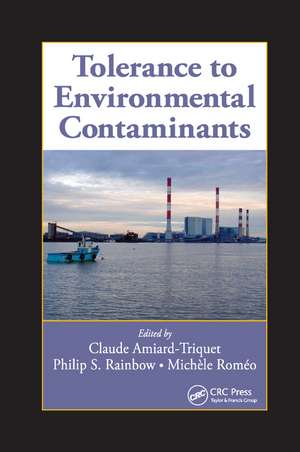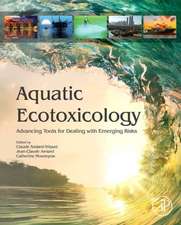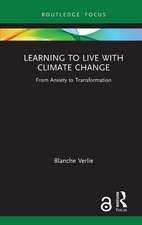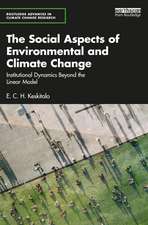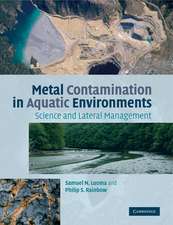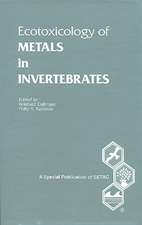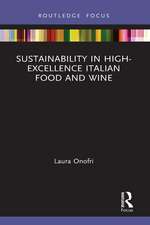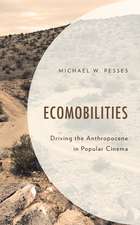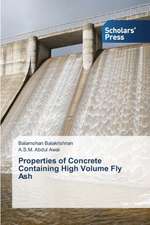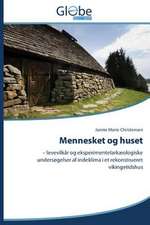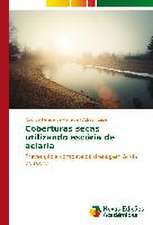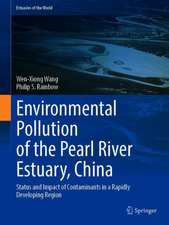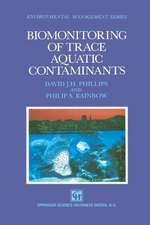Tolerance to Environmental Contaminants
Editat de Claude Amiard-Triquet, Philip S. Rainbow, Michele Romeoen Limba Engleză Paperback – 19 sep 2019
Tolerance to Environmental Contaminants takes a multidisciplinary approach across contaminant types, habitats, organisms, biological levels of organization and scientific disciplines. The book examines the general principles governing the acquisition and biological consequences of tolerance, genetically or physiologically based, at different levels of biological organization, taxonomically from bacteria and archaea to flowering plants and vertebrates, and within organisms from molecular biology and biochemistry through physiology to whole organism, community, and ecosystem levels of organization.
Presenting a state-of-the-art synthesis of the many aspects of the phenomenon of tolerance to environmental contaminants, this volume covers mechanisms of defense involved in the acquisition of tolerance, different classes of environmental contaminants, positive and negative ecological consequences of tolerance and the impact of tolerance in bacteria, plants, and insects on society. The reviews presented in this book supply the tools for carrying out more informed and therefore more reliable risk-benefit analyses when assessing the ecotoxicological risks to life in any of the contaminated habitats that now surround us in our industrialized society.
| Toate formatele și edițiile | Preț | Express |
|---|---|---|
| Paperback (1) | 495.83 lei 6-8 săpt. | |
| CRC Press – 19 sep 2019 | 495.83 lei 6-8 săpt. | |
| Hardback (1) | 1122.16 lei 6-8 săpt. | |
| CRC Press – 21 ian 2011 | 1122.16 lei 6-8 săpt. |
Preț: 495.83 lei
Preț vechi: 583.33 lei
-15% Nou
Puncte Express: 744
Preț estimativ în valută:
94.89€ • 98.70$ • 78.34£
94.89€ • 98.70$ • 78.34£
Carte tipărită la comandă
Livrare economică 14-28 aprilie
Preluare comenzi: 021 569.72.76
Specificații
ISBN-13: 9780367383114
ISBN-10: 036738311X
Pagini: 464
Dimensiuni: 156 x 234 x 24 mm
Greutate: 0.64 kg
Ediția:1
Editura: CRC Press
Colecția CRC Press
ISBN-10: 036738311X
Pagini: 464
Dimensiuni: 156 x 234 x 24 mm
Greutate: 0.64 kg
Ediția:1
Editura: CRC Press
Colecția CRC Press
Public țintă
Academic and Professional Practice & DevelopmentCuprins
Pollution Tolerance: From Fundamental Biological Mechanisms to Ecological Consequences. Tolerance to Contaminants: Evidence from Chronically-Exposed Populations of Aquatic Organisms. Inter- and Intra-Specific Variability of Tolerance: Implications for Bioassays and Biomonitoring. Microbial Pollution-Induced Community Tolerance. Tolerance to Natural Environmental Change and the Effect of Added Chemical Stress. Mechanisms of Defence and the Acquisition of Tolerance to Chemical Stress. Biodynamic Parameters of the Accumulation of Toxic Metals, Detoxification and the Acquisition of Metal Tolerance. Antioxidant Defences and Acquisition of Tolerance to Chemical Stress. Biotransformation of Organic Contaminants and the Acquisition of Resistance. Stress Proteins and the Acquisition of Tolerance. The Multixenobiotic Transport System: A System Governing Intracellular Contaminant Bioavailability. Ecological and Ecophysiological Aspects of Tolerance. Tolerance and Biodiversity. Cost of Tolerance. Tolerance and the Trophic Transfer of Contaminants. Case Studies. Bacterial Tolerance in Contaminated Soils: Potential of the PICT Approach in Microbial Ecology. Adaptation to Metals in Higher Plants: The Case of Arabidopsis halleri (Brassicaceae). Insects and Pesticides. Conclusions.
Notă biografică
Claude Amiard-Triquet, Philip S. Rainbow, Michèle Roméo
Descriere
This up-to-date compilation from international experts covers the tolerance of living organisms to toxic contaminants. It examines the degree of generalization of tolerance at different levels of biological organization. It discusses the defense mechanisms involved in the acquisition of tolerance to different classes of environmental contaminants, taking into account the limits at which such mechanisms are overwhelmed. The book also considers the ecological consequences and specific aspects of tolerance, especially those that impact the environment and society.
